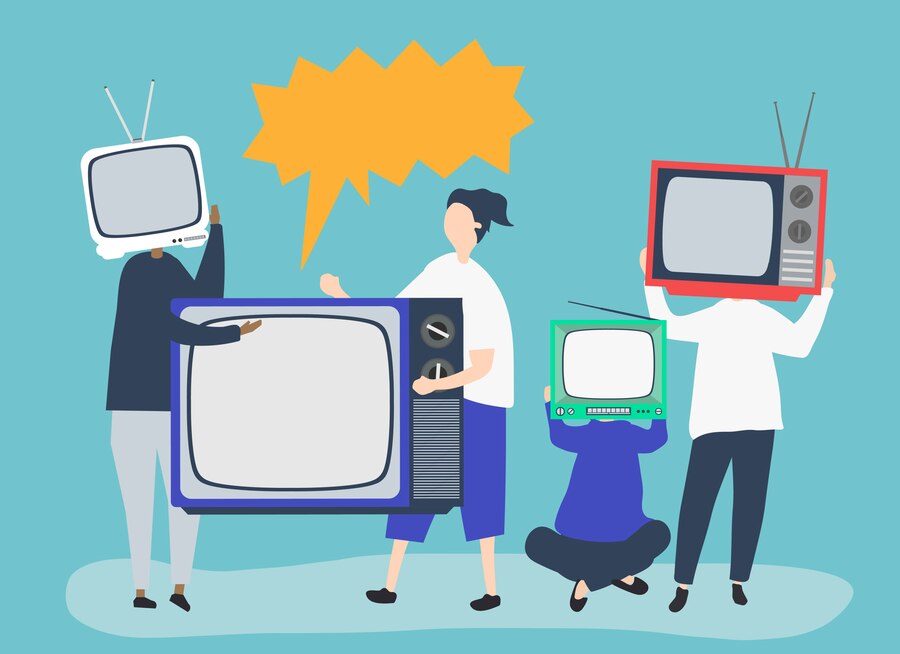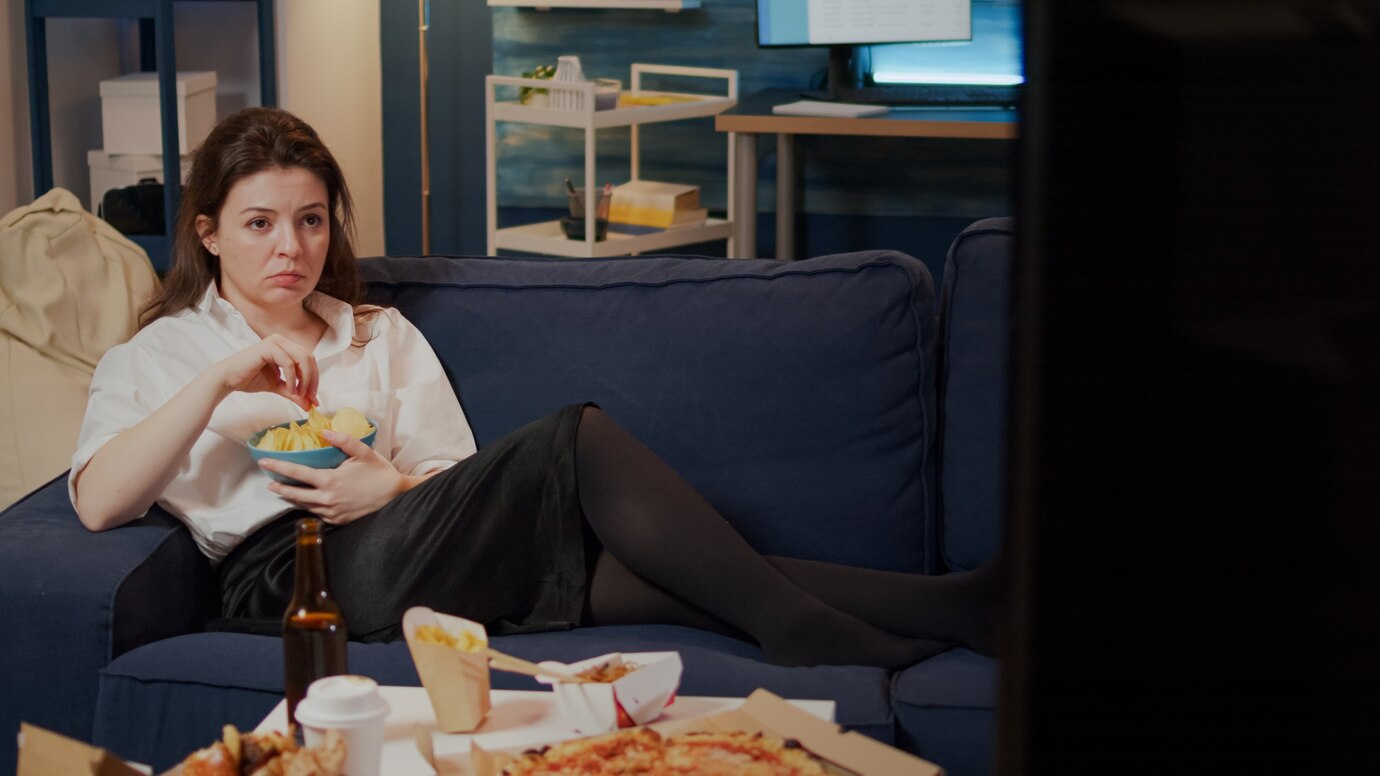Βy Afroditi A. Karagianni,
In Greek television, and probably in that of other countries too, the minute the clock strikes noon, it is time for the programs that are referred to as “panels” to take the stage. Typically, panels are TV shows, where people called panelists (some of whom are celebrities, and others journalists) discuss cultural events, news, stories, and –most importantly– the personal lives of other people, and are led by one host or hostess, in most cases.
Panels could by no means escape one’s notice. Almost every Greek channel has more than one TV show of the category in its weekly program, and most shows enjoy quite large viewership numbers. Their hosts are definitely given the long side of the stick though. In Greece, TV hosts of the kind get paid a vast amount and are leading very comfortable lives thanks to their careers. “The show’s crew is content, their channel is satisfied, everyone who learns the latest gossip is pleased, so what exactly is the problem?”, one might ask.
Personally, I believe that, despite their appeal and popularity, such TV shows are the root of many evils, and –in their current state– do not really deserve the limelight they enjoy, and honestly, any airtime at all.
For starters, a core subject of interest to these shows is the personal lives of celebrities, politicians, influencers and basically anyone that is more famous than the common man. Surely, public figures were always aware that their lives would be under scrutiny, if they ever got famous. Besides, it is widely known that the audience admires, looks up to and even idolizes those that they see on the screen. However, nothing prepares them for the accusatory, unethical and offensive way in which their stories are being told around the large (usually round) tables of panels. Their romantic relationships, sexual preferences, gender identity, breakups, kids’ upbringing and even their psychological problems and substance abuse issues are all up for commentary, by people highly insensitive and visibly misinformed. Nothing is off the table, literally. Without knowing much about people’s situations, panelists feel the –almost compulsive– need to educate, criticize and advise celebrities regarding their lives and choices. As if the people concerned are not already aware of the circumstances they are in or the problems they might be dealing with. Occasionally though, the merciful panelists give out their thoughts and prayers to the people they viciously attack, which are then followed by a disappointed, worried or troubled nod from the hostess, who then casually presents the next topic of discussion, an anti-ageing cream, for instance.

And that leads me to the next problem I have with this kind of TV shows. The type of products they advertise, and the way this idea is executed. Certainly, product placement is nothing if not common in today’s shows, movies, television series and music videos. Love or hate them, one might argue that these indirect advertisements are an important financial aid to the programs they are in. In fact, they are often needed so that smaller artists like show writers, directors and singers can have the proper funds to bring their ideas and creative vision to life.
Nevertheless, in panels, the sort of products advertised all fall into the same category, as they mostly targeted towards women. In fact, anti-ageing creams, skin toners, fat loss pills etc. are promoted in a very offensive and indiscreet manner, that often makes female viewers feel extremely self-conscious. Anyone that has watched a panel at least once in their lifetime has witnessed the following scene: A lady chats with the hostess while urging the women watching to buy her products, and then proceeds to highlight the importance that they look attractive, fresh and young. This reality is incredibly sexist and encourages women to manufacture their appearance, so that it pleases others and adheres to society’s expectations. As I see it, women, men and everyone in general should be equally encouraged to take care of themselves the way they want, dress according to their own style and appreciate their changing and ageing bodies. Instead of panels advertising plastic surgery institutes, fat loss products and anti-aging makeup, people must start listening to themselves and their bodies and take care of their health and appearance, while appreciating their natural beauty and the years they have been blessed with.
Moreover, many panels have, over the years, been accused of presenting serious topics and societal issues in a very distorted and discourteous manner. For example, domestic abuse survivors are often immensely disrespected, as the panels’ guests and members (at times joined) mock, dispute and deprecate them. Frequently, panels condemn people’s decision to come forward and file reports. Sometimes, they even go as far as list the ways –they think– the victims came out more benefited (through court payments, the acquisition of their kids’ custody and the fifteen minutes of fame they receive) than harmed from the assault they endured. Additionally, the careers and the lives of the culprits are commonly mentioned in these outrageous conversations, when the panelists claim that “such accusations might ruin the accused’s future”, even in cases where the police have already announced that the accusation made by the victim was true. This is so problematic, in so many ways.
By broadcasting such cases in this manner, the audience receives the false message that the abuser’s safety, reputation and integrity are far more important than those of the victim’s. Consequently, thanks to these shows, survivors of violent attacks often feel as though they do not matter, and their stories are unimportant. To make matters worse, they think that even if they make up the courage to report what they go through, they will neither be believed nor taken seriously. This never – ending cycle of violence and mistreatment continues, and many report – worthy cases never reach the authorities. It goes without saying that immigration, gang attacks, theft and other pressing matters are also presented in extremely inappropriate ways by panels, whose members often reproduce their racist, homophobic, sexist and generally toxic, alarming beliefs, and reinforce them to the members of the public who happen to lack both the critical thinking skills and sufficient knowledge required for the topics examined.

Another issue I take with these shows revolves around the way news is presented. Especially, the news that involve people that are either suffering from an illness, have recently lost a loved one, or in general are faced with an unthinkable, unbearable tragedy. Panels take these people’s stories and present them to the audience, only after adding sorrowful music, striking, and explicit images and big, neon, eye-catching headlines that immediately capture the viewers’ interest. In other words, such TV shows unethically exploit the awful things many among us go through. Surely, some people find comfort in sharing their experiences and truth with the public through these programs. However, I cannot help but think that ultimately, these very programs they trust to tell their story are doing it in very insensitive, irresponsible and exploitative ways, so that they can advance their rating and acquire more profit.
Finally, the topics discussed in panels are mostly unimportant. Which celebrity went where, what they wore, how they acted, who they talked with, what they did while on vacation, what types of fast food they eat, and who are they dating currently –if they are comfortable sharing, of course. (And now that I think about it, even when the celebrity concerned has not given their permission, somehow, they find that their privacy has been invaded, by the panels’ hired paparazzi). All the above, leave the majority of us indifferent and quite bored, since the world is filled with much bigger problems. Wars, climate change, racism, sexism, police brutality, criminal acts, hate crimes against different minorities and political developments are only a few recurring issues that today’s societies are faced with. To be fair, getting informed about the more insignificant topics can help one feel more relaxed and entertained. At the same time, one forgets –even for a mere moment– all the hardships they face when learning about the skincare routine or eating habits of a popular celebrity. Nonetheless, it is important to make sure to have our focus mostly shifted towards the bigger things, and watch shows that do just that. That way, we will be informed about both the global developments and the ways in which we can positively impact the world, by taking part in the efforts for change that are being made, all around.
To conclude, panels are to me, full of issues that need fixing. Surely, some among the plethora of people who work in these shows truly mean well and do not wish to offend, critique or dishearten others. Nonetheless, the reality, sadly, remains the same. These shows are incredibly toxic, unserious, insensitive and pretentious. They constantly discuss personal matters of people that need not to be presented, and when they try to comment on serious and pressing issues, they appear to fall incredibly short. Panels’ rude, misinformed and arrogant members constantly pull all the stops, in their desperate attempts to generate higher ratings, and often exploit people and their experiences to achieve their goal. If this reality does not shift soon, I’m afraid that the level of television will keep plummeting (yes, even more!). As a result, the audacity of the panelists will increase, and their panels will remain what they have always been, an utter and complete disaster, since them being a simple ‘joke’ has long been surpassed.




